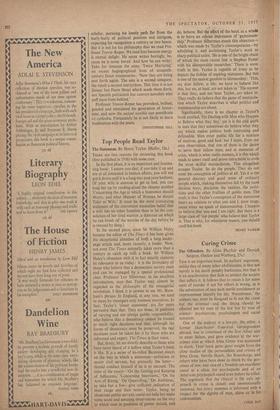Top People Read Taylor
The Statesman. By Henry Taylor. (Heifer, 18s.) THERE are two reasons for reviewing this book (first published in 1936) with some care.
In the first place, it is an important and fascina- ting book: I assure you that, if you take it up and are at all interested in human affairs, you will not put it down until it is a long way past your bedtime. (If your wife is anxious to get to bed, you can keep her up by reading aloud the chapter entitled 'Concerning the Age at which a Statesman should Marry, and what Manner of Woman he should Take" to Wife.' It must be the most convincing statement of the convenient masculine belief that a wife has no other function than to be the con- solation of her tired warrior, a doormat on which he can brush off the worries of the day before he is rescued by sleep.) In the second place, since Sir William Haley became the editor of The Times it has been given the exceptional attention of both a long. leader- page article and, more recently, a leader. Now, not even The Times normally takes more than a century to catch up with a book. Sir William Haley's obsession with it in fact exactly captures its relevance to us today : it is the formulary of those who believe that a democratic society must and can be managed by a special professional class. Professor Leo Silberman, in his excellent introduction, says that Taylor may almost be regarded as the philosophy of the managerial revolution. I think it is unwise to use Mr. Burn- ham's phrase. In England, at any rate, we tend to mean by managers only business executives. In fact, Taylor's 'closet statesmen' arc far more pervasive than that. They are those, in positions of varying and not always public responsibility, who believe that a democracy cannot be trusted to reach right decisions and that, although the forms of democracy must be preserved, the real decisions must be taken for it by those who are informed and expert. The Times is their voice.
But, firstly, let me shortly describe to those who have never heard of it before what Taylor's book is like. It is a series of so-called Baconian essays on the way in which a statesman—politician or senior civil servant, but primarily the latter— should conduct himself if he is to succeed. The titles of the essays—'0n the Getting and Keeping of Adherents,' Concerning Interviews,' On the Arts of Rising,' On Quarrelling,' On Ambition,' to take but a few—give sufficient ,indication of their range and their tenor. Taylor, being an observant public servant, could not help but make some acute and amusing observations on the way in which men in positions of power should, and do, behave. But the effect of the book as a whole is to leave an odious impression of 'gamesman- ship.' Professor Silberman meets this objection— which was made by Taylor's contemporaries—by admitting it, and acclaiming Taylor's work as sharp political satire. 'He is one of the bright chain of which the most recent link is Stephen Potter with his disreputable researches.' There is some truth in this. Taylor is capable of irony as he depicts the foibles of aspiring statesmen. But this is one of the easiest gambits in lifemanship: 'This, my dear fellow, is life; we have to behave like this, but we, at least, are not taken in.' The answer is that they, and not least Taylor, are taken in. They really do believe that the game of manipula- tion which Taylor describes is what politics and statesmanship are about.
Significantly, there is no chapter in Taylor's book entitled, 'On Dealing with Men who Happen to Believe what they Say,' yet it is the odd quirk in men that they sometimes do believe what they, say which makes politics both interesting and defensible. Men enter public life for a mixture of motives, good and bad; but I insist, from my own observation, that one of them is the desire to serve their fellow men; and at moments of crisis, which is what really matters, it is this which tends to assert itself and prove intractable to even the most skilful manipulation. This altogether escapes Taylor. So do the people. They do not enter his conception of politics at all. Yet it is the general decency and good sense of ordinary people which, making themselves felt by the most devious ways, discipline the vanities, the ambi- tions and the other frailties of public men. The truth is that Taylor's conception of the statesman bears no relation to what you and I, poor mugs, mean when we speak of statesmanship. 1 happen to believe that you and I are right. But there is a large class of 'top people' who believe that Taylor is. That is why, for whichever reason, you should read this book.
HENRY FAIRLIE.


































 Previous page
Previous page